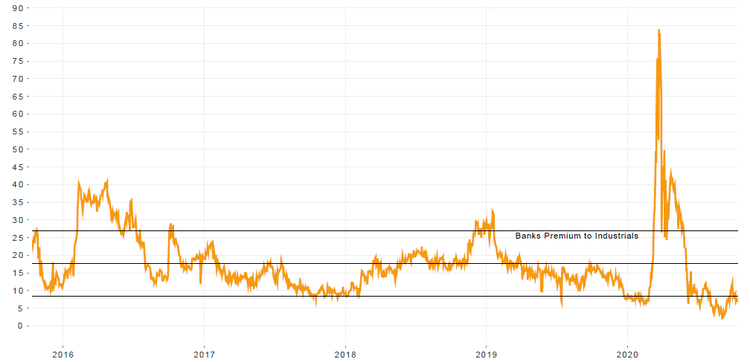Earnings season started last week with most U.S. banks reporting Q3 results. Stock investors were unimpressed as the outlook for bank earnings is cloudy with a forecast for lower net interest margins, less trading revenues (after the surge this year) and no assurance credit losses can be mitigated.
But bank bonds are doing well in this downturn (after some volatility) and are now close to multiyear credit spread tights verses industrial credits. What gives?
Credit Spread Differential Between Bank and Industrial Corporate Bonds (in basis points)

Source: Barclays as of 10/15/2020
The Fed has your back if you are a bondholder. Bondholders care about capital, liquidity, credit quality and less about small changes in earnings. And the Fed is helping us where it really counts. The Fed and politicians were chastened by the severity of the bank crisis and made amends. The Dodd-Frank Wall Street Reform and Consumer Protection Act was enacted in 2010 after the Great Recession. The landscape was changed. Capital levels are doubled, in many cases, liquidity was greatly enhanced, and the Fed set up stress tests to ensure banks are better managing credit risk and can withstand just about any imaginable economic scenario.
And ten years after Dodd-Frank the Fed is still vigilant to make the banking sector safer, duller and of less of interest to shareholders. On September 30th the Fed extended large banks prohibition on share buybacks and will continue to cap dividends to ensure capital levels are more than robust. And last week regulator’s fined Citigroup $400 million to ensure Dodd-Frank is followed. The Fed said, “Among other things, the firm (Citi) has not taken prompt and effective actions to correct practices previously identified by the Fed Board in the areas of compliance risk management, data quality management, and internal controls.”
All this is good for bondholders and is a world of difference from the Great Recession. We have many economic concerns today, but at least we do not have to worry as much about the safety and soundness of our bank bonds.
Source: Federal Reserve as of 10/19/20



